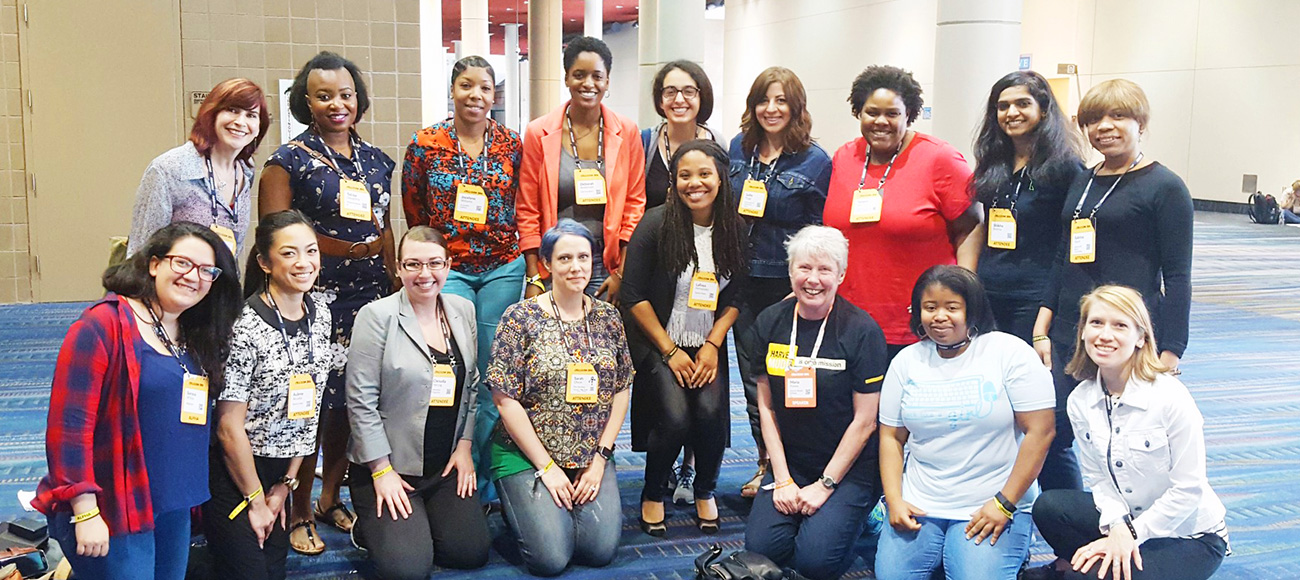
8 Ways to Create Opportunities for Women in Tech

There are many creative approaches that individuals and groups are trying out as they aim to foster more diversity in their workplaces. We can all learn through hearing about each others’ experiences and iterating on our tactics. Last month I was part of a group of women sharing insights at the Roundtable for Women in STEAM at Collision. I think many of you will find the conversations we had inspiring and reflect on the opportunities available within your own enterprises. If you try something that was suggested or you found this article helpful, let us know!
1) Encourage Girls of all Walks of Life to Consider Tech Careers
The host of the Roundtable, Maria Klawe, opened the session by stating that computer science is a wonderful career opportunity for women, as it can lead to higher income levels and more stability for families – perhaps maybe even increasing many of the GDPs in the world, by injecting trillions of dollars with women’s additional contributions. There are clearly many benefits to be had: everything from improving the quality of the work environment for everyone, to building more profitable business, and a more equitable world for all.
One woman spoke about a program she’d been involved in to promote computer science careers to college students, but her group realized that they should have been targeting girls in grade school. In contrast, the founders of QueenHype also told us about their non-profit, where they facilitate workshops for girls in underserved communities to promote self esteem. Through peer coaching they have seen girls from different social circles come together to foster individual progress and career success.
2) Create Better Academic Computer Science Programs
At Harvey Mudd College, where Maria Klawe became the school’s fifth president in 2006, they’ve been able to increase women’s enrollment in computer science. Maria Klawe explained: ‘We changed the introductory courses to make them more engaging and less intimidating. Then we separated the students by levels of experience to tailor teaching. We gave them a great introductory course and then persuaded them to take just one more. By that point they’d get their summer internship offers, and by the third course they’d decide to Major. We made the pathway easy.’ Another woman who was in the academic setting said that when female students don’t feel welcome they support them to talk about the issues and the solutions they envision.
‘It takes a real commitment. You have to think about all the barriers and remove them.’ – Maria Klawe
3) Remember to Iterate and Try Something New
Maria Klawe told us about her impressive career path, being a woman with a PhD in mathematics in 1977 with few career prospects, and shortly after getting a PhD in Computer Science, where she easily found work. Now she tells people: ‘There aren’t enough people who know how to do web design or startup marketing for the demand that’s currently there. There are all kinds of wonderful careers in the tech industry. I told my sister who is aged 61 this, and now she’s graduating in a web related program. I’m so proud of her.’ ‘Don’t be afraid to take a turn in your career path. It can be really powerful.’
Build Your Nascent Startup with Diversity in Mind
For startups who are just starting to build teams, it’s worth mentioning that it’s a lot easier to build diversity early on, rather than waiting until there is already a skew on your team toward one particular group. So, start early, but also remember, it’s never too late to try something new.
4) Create Mentorship Programs or Coaching Networks
Many women highlight the importance of mentorship. ‘I can take a leap to try something – no matter how scared I am, and I can be fearless enough to do it,’ one woman in the group said. Maria Klawe said, ‘You’re never too young to mentor someone. You learn more from being a mentor than the mentee learns. You see the world from their view, and then you end up with more knowledge for your own path.’ ‘We need to build confidence in everyone and demystify success. If you’re a woman or not a member of a dominant group, chances are you aren’t getting information about how to be successful. Most women don’t feel they have equal access to promotion.’
5) Promote the Visibility of Minorities Within the Industry
Visibility is key. One woman working in New Orleans explained, ‘I always try to be on the scene, and tell people that I am here to help. I think it’s important to build your own circle and connect. I tell women “you don’t have to be a coder to be employed in the tech industry”. I want them to see that they don’t have to follow a traditional career path.’ Meanwhile another woman said she’s working on personal branding so she can become an accessible mentor for others.
6) Consider Creating a Full-time Diversity Position
One woman said, ‘There are 350 people at Slack, and they have one diversity person at this point. So, what I did here at my company is I started a panel on women in leadership and invited guests. I essentially made my own channel outside of the company, and in the end my employer started sponsoring my events. Now I’m creating my own role for Diversity at our company. — Don’t wait and ask for permission. Just do it. Take action and make things happen.’
Another woman had a similar story about creating a Diversity role: ‘I’ve been a developer for 20 years. I was in a corporate office and then went to a smaller ‘bro-code’ shop, which had 20 developers and only 5 to 10 women. I started a local chapter of Women Who Code, and I’ve become a thought leader. When my CEO saw me speak on a panel, he realized how knowledgeable I was on this subject, and now I’m heading up Diversity at work. I have a voice and I can make changes. We’re focused on fixing the issue of talent retention because some women leave around mid-career. We’re also training people about their unconscious biased and we include men in the conversation. Women can be just as biased as men — and that’s also a problem we address.’
7) Build Confidence and Authenticity Amongst Team Members
Another approach suggested was that we should support authenticity. One participant in the group said that she’s learned to own and refine her own aggression. She said, ‘If something makes you angry, call it out. If someone doesn’t listen to you – speak up. When you are a truth-teller you’ll encourage others to build an open and safe culture at work.’
Another said, ‘I’m a mom and wife; and being pulled in all these different directions all the time. Taking the time to think about what I want through reflection, prayer, and meditation, has helped me to realize that it’s most important to stop and drown out all the demands, and nurture myself.’
8) Promote Stretch and Learning Opportunities
We can all grow, and we must accept that we’re not perfect. Maria Klawe shared a story about her own growth: ‘I had to learn to be less direct and to use waffle words more to get my ideas across effectively. I had to learn a range of forms of expressions. My advice is to practice being confident, assertive, and shy – all the important communication skills that will serve you in different settings. Don’t be afraid to ask for help. If you’re a member of an underrepresented group, you’re less likely to ask for help because you don’t want to seem less confident.’
Diversity in the Rangle Context
Here at Rangle, our Diversity Guild is hard at work addressing our internal approach and attitudes toward diversity. We started our Guild under the name ‘Women in Software’ out of a desire to encourage more women to join Rangle as developers. Going forward, our goal is to seek out diversity in all areas of the company, while creating a culture that propels both our individual and Rangle’s growth, creativity and evolution. Emily Porta, a member of the Diversity Guild at Rangle, explains, “Our larger goal is to increase the diversity of Toronto’s tech community as a whole. While some tech companies believe the answer to increased diversity within their organizations is simply to attract the few women and other underrepresented groups in the field, this can ’unicorn’ (tokenize) minorities in the process, and leaves the community where it started. We want to do better than that.”
We’re now at an exciting point as we continue to move toward our goals. If you’re keen to talk about diversity in tech with us, connect and chat with us on twitter, or join one of our community meetups. If you are interested in one of our open roles, you can learn more and apply through our careers page.
—
Originally published on the blog of Rangle.io: http://blog.rangle.io/8-brilliant-ways-to-create-opportunities-for-women-in-tech/
